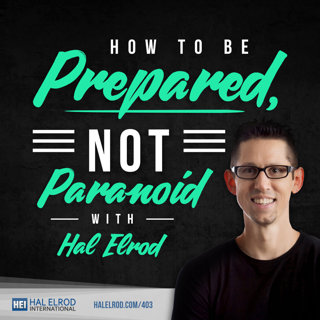Om episode
I know this is a departure from topics I normally address on the podcast, but I hope you’ll listen and take this episode seriously, as well as read this email for more details and resources. I took the time to record this for you from a place of moral obligation. I don’t know if you’re aware, but we are experiencing a severe, unprecedented global supply chain crisis, and I’ve been researching and considering what this could mean for all of us. Specifically, there is a realistic possibility that we could experience food shortages in the relatively near future (this fall/winter). I’m talking about grocery stores and restaurants not being able to get food, and thus each of us having to rely on our own supply for an unknown length of time. After experiencing relatively minor food shortages when the pandemic hit (think empty grocery shelves and no toilet paper), and more extreme shortages here in Texas last winter during what was known as the “snow-pocalypse” (it was very difficult to find any meat at grocery stores), and now paying close attention to the current supply chains (I have friends in related industries who have confirmed it’s even worse than we’re being told), I encourage all of us to get at least a 30 day supply of food. Although being prepared for longer (2-6 months) wouldn’t hurt. As for what food to buy, if you Google “emergency food” you’ll get a bunch of unhealthy 25-year shelf life foods that are loaded with preservatives. But if you value eating healthy, I recommend simply ordering organic rice & beans, as well as mung beans that you can sprout (Google how to do that) - so that you can have “living” food that is also high in protein (7 grams of protein per 1 ounce). None of those are very expensive, even the organic stuff. I get all of the above on either Amazon or FoodToLive.com. As for meat, I recommend stocking up now and if you can afford it, getting a deep freezer to store it in. My wife and I found a used one on Craigslist and also use it to freeze a good amount of organic vegetables. We also got a backup generator to power our fridge and freezer, in case we lose power like we did last winter in Texas, for 5 consecutive days. If you want more variety, you might also consider buckwheat, oatmeal, nuts, freeze-dried fruits, and canned foods. Also, if you live in an area that experiences frozen pipes or power outages, stock up on bottled water and/or get a water filtration system like a Berkey filter (last year we also lost running water for 5 days). To be clear: I’m not advocating hoarding or panic buying. Consider that if we each buy a little bit more now, while supply chains are still in tact, and stock up on what we might need in an emergency situation, then if we reach an emergency situation, those who prepared in advance don’t have to go to the store and take food off of the shelves from those who weren’t prepared. And BTW, I’m certainly not trying to scare you. That’s not my intention here. Preparation isn’t about becoming paranoid. Quite the opposite. It’s about knowing that you’ll be ready for whatever comes, rather than worrying about what might be. In this short episode, I explain what I’ve been doing to plan ahead, including actionable steps you can take and resources you can use to be prepared. Hopefully our supply chains get figured out, but I’d rather us all be safe than sorry/hungry. 🙏🏼❤️ Key Takeaways The two mantras I live by–and why I don’t see any value in sustained fear. Why we may experience unprecedented food shortages this winter. The longest-lasting, most affordable, healthiest food you can buy that isn’t loaded with preservatives. The benefits of eating living food. Why I’m not advocating hoarding or panic buying–and how to help people who aren’t as well-prepped as you. Get The Full Show Notes To get full access to today's show notes, including audio, transcript, and links to all the resources mentioned, visit HalElrod.com/403 Subscribe, Rate & Review I would love if you could subscribe to the podcast and leave an honest rating & review. This will encourage other people to listen and allow us to grow as a community. The bigger we get as a community, the bigger the impact we can have on the world. To subscribe, rate, and review the podcast on iTunes, visit HalElrod.com/iTunes. Copyright © 2021 Miracle Morning, LP and International Literary Properties LLC Connect with Hal Elrod Facebook Twitter Instagram YouTube
